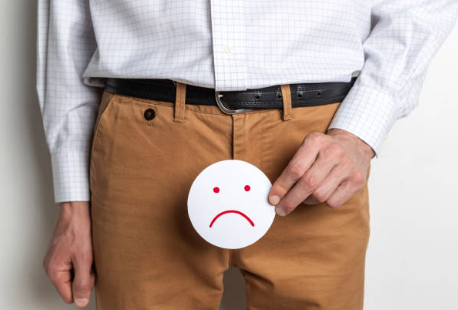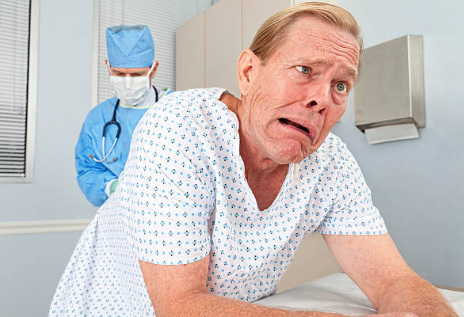Frequent Urination At Night – What you need to know.

Frequent Urination At Night Destroying Your Life? Discover Frequent Urination in Men Treatments.
Are you a man over 40 who finds yourself constantly rushing to the bathroom? Does the urge to urinate wake you up repeatedly at night, sabotaging your sleep? Frequent urination in men can be a frustrating and disruptive symptom. Let’s delve into the reasons behind this problem and explore solutions that can restore your quality of life.
What is frequent urination a sign of?
Frequent urination, especially if it disrupts your routine or sleep, could be your body trying to communicate an underlying health condition. Let’s break down some common culprits:
-
Enlarged prostate (Benign Prostatic Hyperplasia – BPH): As men age, the prostate gland tends to enlarge. This can put pressure on the urethra (the tube that carries urine out of the body), making it difficult to empty your bladder completely. Signs of BPH include frequent urination, a weak urine stream, and difficulty starting or stopping urination.
-
Urinary Tract Infections (UTIs): These pesky infections occur when bacteria make their way into your urinary system, which is made up of the kidneys, ureters, bladder, and urethra. Along with frequent urination, UTIs may cause a burning sensation when urinating, cloudy or foul-smelling urine, and lower abdominal pain.
-
Diabetes (Type 1 and Type 2): Uncontrolled blood sugar levels put your kidneys under extra stress. In response, your kidneys work overtime to filter out excess glucose, leading to increased urine output and the feeling of needing to urinate frequently. Diabetes can also cause excessive thirst, another tell-tale sign.
-
Overactive bladder (OAB): This condition is characterized by involuntary bladder muscle contractions, which creates a sudden and uncontrollable urge to urinate, even if your bladder isn’t full. OAB can be caused by nerve signals misfiring, weakened muscles, or conditions like prostate problems and UTIs.
-
Medications: Certain medications, particularly diuretics (water pills) prescribed for conditions like high blood pressure, are designed to increase urine production. If you start a new medication and notice a change in urination frequency, talk to your doctor.
-
Other potential causes: While the above are common, frequent urination can also be attributed to:
- Kidney or bladder problems
- Prostate cancer (although less common)
- Neurological disorders
- Pregnancy
- Interstitial cystitis (painful bladder syndrome)
Important Note: This list isn’t exhaustive. It’s crucial to consult with your doctor to determine the exact cause of your frequent urination and receive appropriate treatment.
Anxiety Urination: How Your Worries Can Take Over Your Bladder
Can those racing thoughts and heart-pounding moments of anxiety really send you rushing to the bathroom? The answer is a resounding yes! Anxiety can unleash a cascade of physiological changes that can make you feel like you need to pee constantly.
The Stress-Bladder Connection: Understanding the Fight-or-Flight Response
When you feel anxious, your body kicks into high gear with the fight-or-flight response. This survival mechanism prepares you to handle perceived danger, diverting resources away from non-essential functions like digestion and urinary control. One effect can be increased muscle tension in your pelvic floor, making your bladder feel overly full even when it’s not.
Anxiety and Your Urge to Go: It’s Not Just In Your Head
If you find yourself needing the bathroom more often when stressed, it’s not your imagination. There’s a real physiological connection between anxiety and frequent urination. Let’s break it down:
-
The Stress Response: Your Body’s Alarm System When you feel anxious, your body kicks into its “fight-or-flight” mode. This triggers the release of stress hormones like adrenaline, designed to help you deal with a perceived threat. Unfortunately, these hormones can wreak havoc on your bladder function.
-
Oversensitive Bladder: Anxiety on High Alert Stress hormones can make your bladder hypersensitive, signaling the need to “go” even with tiny amounts of urine present. This can lead to a constant feeling of urgency.
-
Reduced Bladder Capacity: Feeling Full Faster Anxiety often goes hand-in-hand with muscle tension. When your pelvic floor muscles are clenched, your bladder might struggle to expand and hold its usual volume, causing you to feel ‘full’ more quickly.
-
Difficulty Relaxing: Incomplete Emptying If you’re tense and anxious, your body may have trouble fully relaxing the muscles needed for complete bladder emptying. This can leave residual urine behind, triggering that nagging urge to urinate again soon after.

Beyond the Bladder: How Anxiety Impacts Urination
Anxiety’s effects on the urinary system can create a vicious cycle:
-
Worry Makes It Worse: If you anticipate needing to pee often, this fear can worsen the anxiety itself, fueling the problem.
-
Sleep Deprivation: Frequent nighttime bathroom visits disrupt sleep, making you more irritable and prone to anxiety the next day.
-
Social Withdrawal: Embarrassment or fear of accidents might make you avoid social situations out of worry about finding a bathroom in time.
It’s Time to Break the Cycle
While anxiety-induced frequent urination is incredibly frustrating, know that you’re not alone. Management strategies and therapies targeting your anxiety can make a significant difference in your bladder health too.
Breaking the Cycle: Managing Anxiety-Related Urination for Lasting Relief
If anxiety sends you on constant bathroom runs, remember – you’re not alone. Addressing the root of your stress is essential for long-term bladder control. Here’s how:
-
Mindfulness Techniques: Calm Your Body, Calm Your Bladder
- Deep Breathing: Focus on taking slow, deep breaths from your belly. This signals to your body that it’s safe, reducing fight-or-flight sensations.
- Meditation: Even just a few minutes of guided meditation can help quiet your racing mind and reduce overall anxiety levels. Apps like Calm or Headspace provide fantastic resources.
- Yoga: The combination of movement, breathwork, and mindfulness found in yoga makes it a powerful tool for anxiety reduction.
-
Therapy: Professional Guidance for a Less Anxious You Cognitive-behavioral therapy (CBT) is particularly effective for anxiety disorders. A therapist can help you:
- Identify Stress Triggers: Understand what causes your anxiety spikes in relation to urination worries.
- Challenge Anxious Thoughts: Learn to reframe negative, spiraling thoughts that lead to more bathroom trips.
- Develop Coping Strategies: Gain practical techniques to manage anxiety in the moment, preventing that urgent “need-to-go” sensation.
-
Lifestyle Adjustments: Support Your Body and Mind These changes promote overall well-being, making you more resilient in the face of stress:
- Regular Exercise: Aim for at least 30 minutes of moderate-intensity exercise most days. This is a fantastic natural stress reliever.
- Quality Sleep: Sleep deprivation makes anxiety worse. Prioritize 7-8 hours of restful sleep each night.
- Healthy Diet: Focus on whole foods, and limit processed snacks, too much caffeine, and excessive alcohol, as these can worsen anxiety symptoms for some people.
Important Note: If your anxiety feels overwhelming or is causing significant disruption to your life, a mental health professional can provide personalized support. Sometimes, medication in addition to therapy is helpful for managing severe anxiety.
Important Note: If anxiety-related urination significantly disrupts your life, don’t hesitate to consult your doctor or a mental health professional. Your well-being is worth it!
Is increased urine output a serious problem?
While frequent urination is often a temporary annoyance, it’s wise to stay vigilant. In some cases, it can be a red flag for more serious underlying conditions such as:
-
Prostate cancer: Although less common than a benign enlarged prostate, prostate cancer can also lead to urinary difficulties. Early detection is crucial, so men over 40 (especially those with a family history of prostate cancer) should discuss regular screenings with their doctors.
-
Kidney or bladder problems: Chronic or acute issues with these vital organs can disrupt their ability to filter waste and regulate urine output. Symptoms like frequent urination, along with pain, cloudy urine, or changes in urine color warrant prompt medical evaluation.
-
Neurological disorders: Conditions like multiple sclerosis or Parkinson’s disease can interfere with the signals between the brain and bladder, impacting bladder control and urine output.
Important Note: Don’t let fear take hold if you experience frequent urination. The majority of cases are easily treatable. However, if you notice any concerning changes in your urinary patterns, it’s always best to consult your doctor for proper diagnosis and peace of mind.
Frequent Urination STD Male: When to Seek STD Testing
Sexually transmitted diseases (STDs) are a common yet often overlooked cause of frequent urination in men. Understanding the link between STDs and urinary changes can help you make informed decisions about your health.
-
Chlamydia and Gonorrhea: The Usual Suspects These two bacterial STDs are among the most prevalent and can cause significant discomfort and long-term consequences if untreated. Symptoms include: * Frequent and urgent urination * Pain or burning during urination * Unusual discharge from the penis
-
Other STDs to Consider: While less common, these STDs can also trigger urinary symptoms: * Trichomoniasis: A parasitic infection that can lead to itching and burning. * Mycoplasma genitalium: A bacterial STD with symptoms that may mimic chlamydia or gonorrhea.
-
Asymptomatic STDs: The Silent Culprits Many people with STDs have no symptoms! That’s why regular testing is crucial, especially if you have multiple partners or engage in unprotected sex.
What is Frequent Urination a Sign of? Should I Get Tested for STDs?
If you experience frequent urination along with any of the following, it’s wise to get tested for STDs:
- New sexual partner(s)
- Unprotected sex
- Pain or burning with urination
- Unusual penile discharge
- Sores or lesions on your genitals
The Power of Testing: Peace of Mind and Prompt Treatment
Don’t wait for symptoms to worsen. STD testing is quick, confidential, and can provide fast answers. Early diagnosis and treatment:
- Prevents further spread of the infection
- Minimizes the risk of complications
- Offers peace of mind
Remember: Frequent urination in men can signal various conditions, so don’t self-diagnose. Seeking medical advice and getting tested will provide the clarity you need to regain control of your health.
When do I need to call the doctor about frequent urination?
Seek medical attention if frequent urination is associated with:
- Fever
- Pain or burning when urinating
- Blood in your urine
- Difficulty urinating
Don’t panic! Frequent urination in men is treatable!
Now that we’ve explored potential causes, let’s talk about solutions. Depending on the root of your problem, your doctor might recommend:
- Medications: Options include drugs to relax an enlarged prostate, treat an overactive bladder, or manage infections.
- Lifestyle changes: Dietary tweaks (like avoiding caffeine and alcohol), timed voiding, and pelvic floor exercises can make a big difference.
- Surgery: In severe cases of enlarged prostate, surgery might be necessary for relief.
Natural Remedies: A Potential Path to Relief
While anecdotal evidence supports some natural remedies for frequent urination, it’s essential to consult your doctor before adding supplements or drastically altering your diet, especially if you take ongoing medications. Your doctor can help you determine if natural options are safe and appropriate for your specific situation.
Here are some natural remedies that might be discussed with your doctor:
- Pumpkin seeds: Studies suggest pumpkin seed extract could improve urinary symptoms associated with an enlarged prostate.
- Saw palmetto: A popular choice for prostate health, saw palmetto may alleviate frequent urination in some men.
- Cranberry products: While primarily known for preventing UTIs, cranberry might indirectly ease frequent urination by reducing infection risk.
- Herbal teas: Some herbal teas, like corn silk or Gosha-jinki-gan (a blend of Chinese herbs), have shown potential bladder benefits in limited studies.
Important Considerations for Natural Remedies:
- Effectiveness varies: What works for one person may not help another. Natural remedies aren’t a guaranteed solution.
- Quality matters: Choose reputable brands and discuss the best forms (capsule, tea, etc.) with your healthcare provider.
- Potential interactions: Some herbal remedies can interfere with medications. Always disclose everything you take to your doctor.
A Word of Caution: Don’t Self-Diagnose
While natural remedies might offer support, it’s vital to address the underlying cause of your frequent urination. Self-treatment without a diagnosis could mask a more serious condition.
Should I try natural remedies for frequent urination?
The decision to explore natural remedies for frequent urination should be a collaborative one between you and your doctor. They can assess your individual situation and guide you towards safe and suitable options.
The Emotional Toll of Frequent Urination
Let’s be honest, frequent urination isn’t just physically inconvenient. It can impact your emotional well-being, causing:
- Embarrassment: Fear of leaks or accidents can make you withdraw socially.
- Sleep deprivation: Disrupted sleep leaves you tired, irritable, and less able to cope.
- Anxiety: The constant worry about needing a bathroom can fuel anxiety.
Take Back Control: Proven Tips for Managing Frequent Urination
Don’t resign yourself to a life dominated by bathroom breaks. Empower yourself with these effective strategies:
-
Track Your Fluid Intake: Become a Bladder Detective Keep a simple diary noting what you drink, how much, and when you urinate. This can reveal surprising patterns and help you adjust your fluid intake strategically. Do you tend to drink a lot in the late afternoon and evening? This could be significantly contributing to nighttime disruptions.
-
Limit Bladder Irritants: Your Diet Matters Caffeine, alcohol, spicy foods, and even artificial sweeteners can aggravate your bladder and worsen frequent urination. Gradually reduce or eliminate these culprits to see if it makes a difference.
-
Practice Timed Voiding: Retrain Your Bladder Start by going to the bathroom at scheduled intervals (e.g., every 2-3 hours) even if you don’t feel the urge. Gradually lengthen the time between trips to train your bladder to hold more urine comfortably.
-
Strengthen Those Pelvic Muscles: Kegels are Your Secret Weapon Kegel exercises strengthen the muscles that support your bladder. Find a quiet place and discreetly squeeze and release these muscles repeatedly. Aim for three sets of 10-15 repetitions daily. Be patient – you might not see immediate results, but persistence pays off.
Bonus Tips for Nighttime Relief
-
Ease Up on Fluids Before Bed: Limit beverages a few hours before sleep to reduce those midnight bathroom runs.
-
Elevate Your Legs: If you have any swelling, elevating your legs in the late afternoon can help fluid shift away from your ankles, reducing nighttime urinary urges.
Important Note: If these lifestyle changes don’t provide significant improvement, it’s crucial to consult your doctor. Frequent urination can sometimes signal underlying medical conditions that require professional treatment.
You’re not alone
Millions of men face frequent urination challenges. Seeking medical advice and taking steps to manage this problem can significantly improve your well-being. Don’t suffer in silence – regain your confidence and peace of mind.

FAQs: Your Frequent Urination Questions Answered
FAQ-1: What are the most common causes of frequent urination in men?
ANSWER: The most frequent culprits behind frequent urination in men include:
- Enlarged Prostate
- Urinary Tract Infections (UTIs)
- Diabetes
- Overactive Bladder
- Side effects of certain medications
- Anxiety
FAQ-2: Should I worry about increased urine output?
ANSWER: While often a temporary issue, frequent urination deserves attention when it’s accompanied by:
- Fever
- Pain while urinating
- Blood in urine
- Difficulty starting urination
These could signal an underlying condition requiring medical attention.
FAQ-3: Can anxiety trigger frequent urination?
ANSWER: Yes, anxiety can activate your body’s “fight-or-flight” response, which sometimes manifests as an increased need to urinate.
FAQ-4: Are there natural ways to manage frequent urination?
ANSWER: While it’s essential to get a doctor’s diagnosis and always consult them before making drastic dietary changes, some natural approaches that may help include:
- Reducing bladder irritants (caffeine, alcohol, spicy foods)
- Managing fluid intake strategically
- Practicing timed voiding
- Doing Kegel exercises
FAQ-5: When should I see a doctor about frequent urination?
ANSWER: Don’t hesitate to seek medical advice if you experience any of these symptoms in addition to frequent urination:
- Fever
- Pain or burning sensation when urinating
- Blood in urine
- Difficulty passing urine
SEE ALSO: Latest Prostate Supplements >>
NOTE :
The information provided in this article and the rest of this website is intended for general knowledge and informational purposes only, and does not constitute medical advice. It is essential to consult a qualified healthcare professional for the diagnosis and treatment of any health condition. Never disregard professional medical advice or delay in seeking it because of something you have read in this article.

